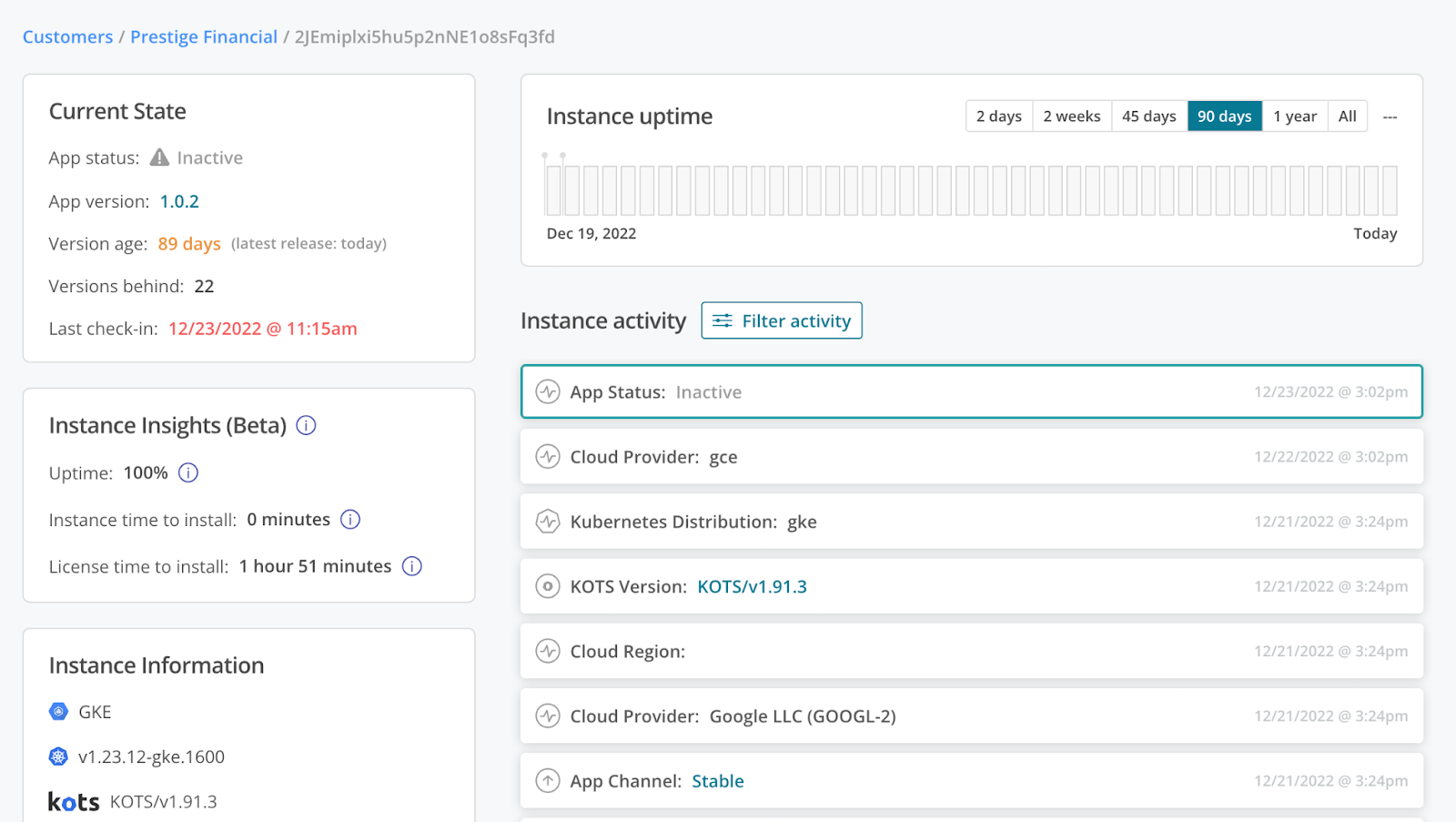
The summer heat is becoming active and our Product & Engineering teams are storming up new features. It’s time for another fresh batch of exciting capabilities newly available in our application manager, our Kubernetes installer, and the vendor portal. Check out the recently shipped features and release highlights for May 2023 below.
What’s New for The Vendor Portal:
Vendor Portal: Inactive Instances are Now Shown as Inactive
When an instance has not reported for 24 hours, it will be flagged as inactive in the vendor portal UIs and APIs. This can help your team get visibility into instances which may have lost their connection to the internet, or have been shut off entirely. How you interpret this data will depend heavily on customer context and understanding. For example, a deactivated instance might indicate a software trial being abandoned, but it might also signal a successful proof-of-concept instance being shut down in favor of a production deployment.


What’s New for The Application Manager:
Application Manager: Ability to Validate Config Values with Regular Expressions
The new config validation capability lets vendors define guardrails using regular expressions to make sure the values provided by the end user are valid. You can find out more about this feature in our recent blog post. If you have expectations for user input, start using this today to make your installer safer!
Application Manager: Now Includes Rendered KOTS Custom Resources in Its Application Archive
When you run kubectl kots download, the archive now includes a rendered version of the custom resource definitions for KOTS. These rendered resources are also available in the View Files tab of the admin console. This will help you understand and fix any bugs with the way that your templates have been specified for application manager resources.
Application Manager: Additional Support for Templating HelmChart Custom Resources
You can now use template functions for the namespace and helmUpgradeFlags fields of the HelmChart custom resource, which gives you more flexibility to incorporate user-provided configuration values into your native Helm installation workflows.
What’s New for the Kubernetes installer:
Kubernetes Installer: Kubernetes Can Now be Updated More Than Two Minor Versions at a Time (v2023.04.24-0)
You can now update the install specification to later kubernetes versions and not have to step customers through kubernetes versions two at a time. This makes it easier to get and keep your customers up to date. If you have customers running old versions of kubernetes, update your specification and get them up to date!
Kubernetes Installer: RHEL and Rocky 9 Support (v2023.04.11-0)
Enterprises can use RHEL and Rocky 9 for their embedded cluster installs. Be sure to update any of your vendor documentation with this new support!
Kubernetes Installer: EKCO is Now Mandatory (v2023.04.10-0)
EKCO (Embedded Kubernetes Cluster Operator) is now a mandatory add-on for embedded clusters. Requiring EKCO allows future migrations to be more seamless and provides a platform to build on for additional features. You can read more about EKCO and its features here.
Kubernetes Installer: Embedded Installer’s Now Supports Two Minor Version Upgrades of containerd (v2023.04.11-0)
The embedded installer can now update two minor versions of containerd. If you have customers that are more than 1 version behind now is a great opportunity to get them up to date!
What’s New for Troubleshoot
Troubleshoot: Preflight Checks Can Now Accept Stdin For Specs
The preflight binary is now able to accept input from sources other than local files or a supported URI path. This makes preflight more composable, with the ability to accept programmatically generated preflights as part of a script or pipeline.

What’s New for replicated Documentation
replicated Documentation: Additional improvements to The Native Helm Docs
We enhanced several areas of the helm native documentation:
We wrote a new example for configuring optional value keys with native Helm deployments.
We added a new diagram to help you visualize how the app manager processes native Helm charts.
We reorganized the topic on using private registries in helm CLI deployments to make it easier to find info about how to support both helm CLI and app manager deployments with the same private registry.
We corrected both the native Helm limitations and the content about using Helm hooks to clarify which hooks are not supported and why.
replicated Documentation: Updated the Config Custom Resource Topic to Specify Which Fields Support Template Functions
The question of which custom resource fields support template functions comes up often. Now, each of the fields in the Config topic clearly states whether or not it supports templating. This will help you find the info they are looking for about support for template functions, and will also make it easier to respond to any new questions that we get with a link to the docs.
That’s it for the May release highlights! Want to learn more about these new features and what replicated does to help vendors and customers install and manage modern apps on-prem? We would love to show you -- click here to schedule a demo.